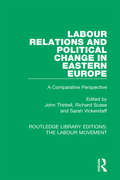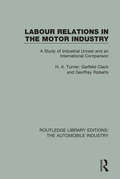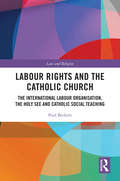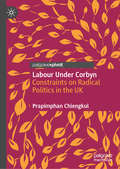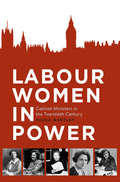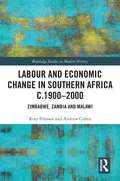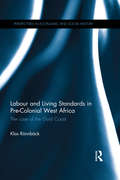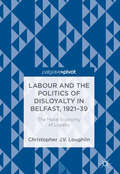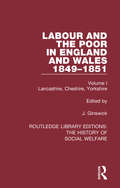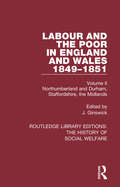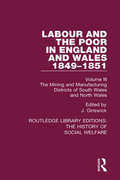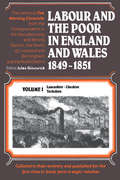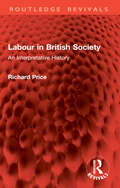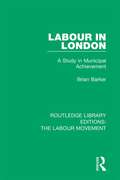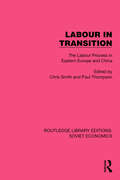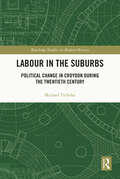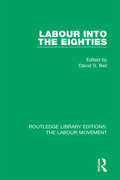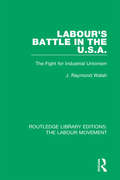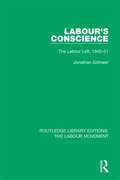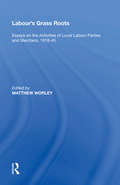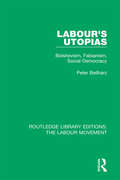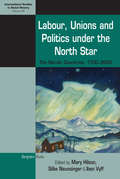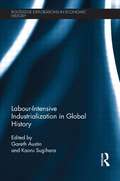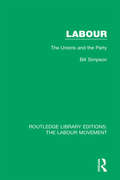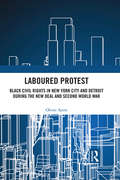- Table View
- List View
Labour Relations and Political Change in Eastern Europe: A Comparative Perspective (Routledge Library Editions: The Labour Movement #39)
by Stephen G. JonesFirst published in 1995. This volume offers a comparative perspective on labour relations and political change in eastern Europe within a common theoretical and empirical framework. Its coverage includes Bulgaria, and Czech and Slovak republics, Hungary, Poland, and Russia. Particular attention is given to the dynamics of changes in labour relations and privatisation, which are now critical to the more general process of political and economic transformation. This title will be of interest to scholars and students of politics, sociology and modern history.
Labour Relations in the Motor Industry: A Study of Industrial Unrest and an International Comparison (Routledge Library Editions: The Automobile Industry)
by Geoffrey Roberts H. A. Turner Garfield ClackThis book, originally published in 1967, takes the automobile industry experience as a basis for a wider view of industrial relations, trends and developments of the 1950s and 60s. The study also analyses the emergence of new institutions and systems of labour-management relationships. It contains chapters on the effects of automotion and technical change, on the impact of fluctuations in the market for cars and on wage trends. There are detailed surveys of some of the biggest post-war disputes and especially of trade union organization, the shop steward system, the experience of individual firms, such as Austin, Ford and Fiat. There is also a comparative survey of labour relationships in other major car manufacturing countries such as the USA, Germany and Japan.
Labour Rights and the Catholic Church: The International Labour Organisation, the Holy See and Catholic Social Teaching (Law and Religion)
by Paul BeckettThis book explores the extent of parallelism and cross-influence between Catholic Social Teaching and the work of the world’s oldest human rights institution, the International Labour Organisation (ILO). Sometimes there is a mutual attraction between seeming opposites who in fact share a common goal. This book is about just such an attraction between a secular organisation born of the political desire for peace and justice, and a metaphysical institution much older founded to bring peace and justice on earth. It examines the principles evident in the teachings of the Catholic Church and in the secular philosophy of the ILO; together with the theological basis of the relevant provisions of Catholic Social Teaching and of the socio-political origins and basis of the ILO. The spectrum of labour rights covered in the book extends from the right to press for rights, i.e., collective bargaining, to rights themselves – conditions in work – and on to post-employment rights in the form of social security and pensions. The extent of the parallelism and cross-influence is reviewed from the issue of the Papal Encyclical of Pope Leo XIII Rerum Novarum (1891) and from the founding of the ILO in 1919. This book is intended to appeal to lay, professional and academic alike, and will be of interest to researchers and academics working in the areas of international human rights, theology, comparative philosophy, history and social and political studies. On 4 January 2021 it was granted an Imprimatur by the Roman Catholic Archbishop of Liverpool, Malcolm P. McMahon O.P., meaning that the Catholic Church is satisfied that the book is free of doctrinal or moral error.
Labour Under Corbyn: Constraints on Radical Politics in the UK
by Prapimphan ChiengkulThis book provides an accessible yet critical analysis of the Labour Party under the leadership of Jeremy Corbyn (2015-2020) in the context of the contemporary British political economy. It analyses structural constraints on left-wing politics and evaluates the transformative potential of Labour’s economic and social policies under Corbyn. Drawing from a neo-Marxist and neo-Gramscian framework, the book argues that the material, institutional and ideological conditions before 2015 opened political space for a left-wing Labour Party, although the dominant historical structures severely limited its chance of coming to power. In addition, the book argues that Labour under Corbyn should not be dismissed as ‘populist’, and that its policies aimed to redress structural economic problems, promote economic democracy and tackle contemporary challenges. The book also highlights the importance of adopting a long-term approach to counter-hegemonic political struggle so as not to shrink the space for progressive politics.
Labour Women in Power: Cabinet Ministers in the Twentieth Century
by Paula BartleyThis book examines the political lives and contributions of Margaret Bondfield, Ellen Wilkinson, Barbara Castle, Judith Hart and Shirley Williams, the only five women to achieve Cabinet rank in a Labour Government from the party’s creation until Blair became Prime Minister. Paula Bartley brings together newly discovered archival material and published work to provide a survey of these women, all of whom managed to make a mark out of all proportion to their numbers. Charting their ideas, characters, and formative influences, Bartley provides an account of their rise to power, analysing their contribution to policy making, and assessing their significance and reputation. She shows that these women were not a homogeneous group, but came from diverse family backgrounds, entered politics in their own discrete way, and rose to power at different times. Some were more successful than others, but despite their diversity these women shared one thing in common: they all functioned in a male world.
Labour and Economic Change in Southern Africa c.1900-2000: Zimbabwe, Zambia and Malawi (Routledge Studies in Modern History)
by Andrew Cohen Rory PilossofThis book explores the social and economic development of Zimbabwe, Zambia and Malawi over the course of the twentieth century. These three countries have long shared and interconnected pasts. All three were drawn into the British Empire at a similar time and the formation of the ill-fated Federation of Rhodesia and Nyasaland formally linked these countries together for a decade in the mid-twentieth century. This formal political relationship created dynamics that resulted in yet closer economic and social links. After Federation, the economic realities of industry, transport and labour supplies meant that these three countries continued to be intricately interconnected. Yet despite these connected pasts, comparative work on the economic histories of Malawi, Zambia and Zimbabwe, and how these change over time, is rare. This book addresses the gap by providing the first comprehensive collection of labour and census data across the twentieth century for these three countries. The different economic models and performances of these states offer good comparison, allowing researchers to look at different models of development, and how these played out over the long-term. The book provides data on population growth and change, industrial and occupational structure, and the various shifts in what the economically active population did. It will be useful for historians, economists, development studies scholars and non-governmental organisations working on twentieth-century and contemporary southern Africa.
Labour and Living Standards in Pre-Colonial West Africa: The Case of the Gold Coast (Perspectives in Economic and Social History)
by Klas RönnbäckSub-Saharan Africa is the poorest region in the world. But its current status has skewed our understanding of the economy before colonization. Rönnbäck reconstructs the living standards of the population at a time when the Atlantic slave trade brought money and men into the area, enriching our understanding of West African economic development.
Labour and the Politics of Disloyalty in Belfast, 1921-39: The Moral Economy of Loyalty
by Christopher J. V. LoughlinThis book provides the first ‘history from below’ of the inter-war Belfast labour movement. It is a social history of the politics of Belfast labour and applies methodology from history, sociology and political science. Christopher J. V. Loughlin questions previous narratives that asserted the centrality of religion and sectarian conflict in the establishment of Northern Ireland. Labour and the Politics of Disloyalty in Belfast, 1921-39 suggests that political division and violence were key to the foundation and maintenance of the democratic ancien régime in Northern Ireland. It examines the relationship between Belfast Labour, sectarianism, electoral politics, security and industrial relations policy, and women’s politics in the city.
Labour and the Poor in England and Wales - The letters to The Morning Chronicle from the Correspondants in the Manufacturing and Mining Districts, the Towns of Liverpool and Birmingham, and the Rural Districts: Volume I: Lancashire, Cheshire, Yorkshire (Routledge Library Editions: The History of Social Welfare)
by J. GinswickThe Morning Chronicle presented the state of the working classes of Britain before the public with clarity, insight and honesty. Consisting mainly of verbatim statements from the people themselves, it was a medium through which the previously inarticulate masses were able to speak with one firm voice. First published in 1983, this book collates the letters from correspondents based in Lancashire, Cheshire and Yorkshire. The letters improve our knowledge of working-class life in nineteenth century England and Wales and provide a unique insight into the impact of industrialization. This book will be of interest to those studying the history of the working class, labour and poverty.
Labour and the Poor in England and Wales - The letters to The Morning Chronicle from the Correspondants in the Manufacturing and Mining Districts, the Towns of Liverpool and Birmingham, and the Rural Districts: Volume II: Northumberland and Durham, Staffordshire, The Midlands (Routledge Library Editions: The History of Social Welfare)
by J. GinswickThe Morning Chronicle presented the state of the working classes of Britain before the public with clarity, insight and honesty. Consisting mainly of verbatim statements from the people themselves, it was a medium through which the previously inarticulate masses were able to speak with one firm voice. First published in 1983, this book collates the letters from correspondents based in Northumberland and Durham, Staffordshire and the Midlands. The letters improve our knowledge of working-class life in nineteenth century England and Wales and provide a unique insight into the impact of industrialization. This book will be of interest to those studying the history of the working class, labour and poverty.
Labour and the Poor in England and Wales - The letters to The Morning Chronicle from the Correspondants in the Manufacturing and Mining Districts, the Towns of Liverpool and Birmingham, and the Rural Districts: Volume III: The Mining and Manufacturing Districts of South Wales, North Wales (Routledge Library Editions: The History of Social Welfare)
by J GinswickThe Morning Chronicle presented the state of the working classes of Britain before the public with clarity, insight and honesty. Consisting mainly of verbatim statements from the people themselves, it was a medium through which the previously inarticulate masses were able to speak with one firm voice. First published in 1983, this book collates the letters from correspondents based in Wales. The letters improve our knowledge of working-class life in nineteenth century England and Wales and provide a unique insight into the impact of industrialization. This book will be of interest to those studying the history of the working class, labour and poverty.
Labour and the Poor in England and Wales, 1849-1851: Lancashire, Cheshire & Yorkshire
by Jules GinswickFirst Published in 1983. In October 1849 a London newspaper, the Morning Chronicle, announced to its middle-class readers that it was to undertake a survey of the condition of the labouring classes in England and Wales under the general title of “Labour and the Poor”. The reports of the survey were published over a period of two years and provided the mid-nineteenth-century Englishman with the most comprehensive view of the working classes that he had ever seen. The letters to The Morning Chronicle from the manufacturing, mining and rural districts and the towns of Liverpool and Birmingham appear here for the first time in book form and have been organised in eight volumes. This is Volume I and offer insights into labour and the poor in England and Wales 1849 to 1851 in the areas of Lancashire, Cheshire and Yorkshire.
Labour in British Society: An Interpretative History (Routledge Revivals)
by Richard PriceWhat part has organized labour played in the history of modern Britain? To what extent has British society been shaped by working class organization in industry and labour in politics? A major reinterpretation of the relationship between the history of the working class and the history of British society from 1780 to 1980, Labour in British Society (originally published in 1986) traces two recurrent themes—how the pattern of social relations in industry has developed since the Industrial Revolution, and how these patterns have been affiliated to national political and economic developments. This book is a must read for students and researchers of history.
Labour in London: A Study in Municipal Achievement (Routledge Library Editions: The Labour Movement #1)
by Brian BarkerFirst published in 1946. This title is a clear and concise account of the march of Labour to the control of the London County Council and its work at County Hall in the 1940s. This study explores the rise of the Labour Party in London and the changes and progress in health, education, and social welfare. Labour in London will be of interest to students of history and politics.
Labour in Transition: The Labour Process in Eastern Europe and China (Routledge Library Editions: Soviet Economics #9)
by Paul Thompson Chris SmithLabour in Transition (1992) examines the massive transformations undertaken by state socialist regimes at the end of the 1980s. It traces developments in the Soviet Union, Eastern Europe and China, in particular the impact of changes in the labour process and broader political economy. Detailed empirical analysis of reform processes is effectively combined with a broader comparative examination of capitalism, socialism and the process of transition to new social formations.
Labour in the Suburbs: Political Change in Croydon During the Twentieth Century (Routledge Studies in Modern British History)
by Michael TichelarThis book is the first comprehensive economic, social and political study of the London suburb of Croydon from 1900 up to the present day. One of the largest London boroughs, Croydon, has always been a mixed residential suburb (mainly private but with some municipal housing), which has strongly influenced the nature of its political representation. It was never just an affluent middle-class suburb or ‘bourgeoise utopia,’ as suggested by traditional definitions of suburbia and in popular imagination. In economic terms it was also an industrial suburb after 1918. It was then transformed into a vibrant post-industrial service economy following rapid deindustrialisation and remarkable commercial and office redevelopment after 1960. In this respect Croydon is also an ex-industrial suburb, similar to many other outer London areas and other peripheral metropolitan areas. Croydon’s civic identity as a previously independent town on the outskirts of London remains unresolved to this day, even as its political representatives seek to redefine the borough as a more independent ‘Edge City.’ Author Michael Tichelar examines this suburb by looking at the suburban development of London, the changing politics of Croydon and policy issues during the twentieth century. Labour in the Suburbs will be of interest to the general reader as well as students of modern British history with special interests in electoral sociology, political representation and suburbanisation. It provides a template against which to measure the process of suburbanisation in the UK and internationally.
Labour into the Eighties (Routledge Library Editions: The Labour Movement #3)
by David S. BellFirst published in 1980. This book covers areas of policy interest viewed from a social democratic perspective and each chapter takes a specific issue which would have been of concern to Labour in the 1980s, including some of the more controversial areas. The study reviews various problem areas and suggests policies which are realistic and applicable in the conditions of the 1980s. This title will be of interests to scholars and students of history and politics.
Labour's Battle in the U.S.A: he Fight for Industrial Unionism (Routledge Library Editions: The Labour Movement #42)
by J. Raymond WalshFirst published in 1938. This study of the labour crisis in the USA consists of interviews with leaders and members of labour unions, unorganised workers, businessmen, and those in positions of public responsibility. The author explores the foundations of the crisis, and examines the possible issues that he predicted the US labour force were going to encounter. This title will be of interest to scholars and students of political and labour history.
Labour's Conscience: The Labour Left, 1945-51 (Routledge Library Editions: The Labour Movement #30)
by Jonathan SchneerFirst published in 1988. The years 1945-51 were crucial to the Labour Party and the Left in Britain. This elegantly written book traces the gradual and painful disillusionment of the Labour Left with the Attlee governments and analyses the alternative, more militant, programme which the Labour Left devised. Never an organised bloc, the author argues that they are best understood as Labour’s conscience – a militant tendency is the true sense of the words. This title will be of interest to scholars and students of political history.
Labour's Grass Roots: Essays on the Activities of Local Labour Parties and Members, 1918�5 (Studies In Labour History Ser.)
by Matthew WorleyThe period between 1918 and 1945 witnessed dynamic social and economic developments in Britain as the notion of a government controlled economy and welfare state took root. In order to be understood, this shift in the political landscape needs to be seen in context of the growth of mass political movements and the implementation of fuller democratic processes in the aftermath of the Great War. But whilst much has been written on the rise of the Labour Party, the decline of the Liberals and the domination of the Conservatives in the sphere of high politics, much less research has been done on the local or regional experience of Britain's main political parties between the wars. This volume brings together ten essays that together provide an introduction to the role, influence and effectiveness of Labour Party activists across Britain. Taking a systematic and comparative approach that examines a range of representative areas, this volume is more than simply a collection of local studies. Instead it utilises the local to develop and illuminate the wider dynamics at work inside the Labour Party. By emphasising the role of the party membership, Britain's social and political evolution can be reconstructed from grass-roots level, taking into account the priorities and expectations of the people who sustained and cultivated the nation's social-political base. By addressing reoccurring issues of interest to labour historians, such as gender, nationalism, the co-operative movement and trade unionism, through the locus of regionalism and local party activity, this volume will not only provide scholars with a better understanding of the Labour Party, but should stimulate similar much needed research into other political parties and organisations.
Labour's Utopias: Bolshevism, Fabianism, Social Democracy (Routledge Library Editions: The Labour Movement #2)
by Peter BeilharzFirst published in 1992. The collapse of communist rule in Eastern Europe has led to a widespread view that socialism is a dead, or at least dying, force. Labour’s Utopias argues that this assumption is based on the popular conception that socialism’s various traditions are simply different means to a common end. The author looks at three strands of socialism – Bolshevism, Fabianism and German Social Democracy – in order to assess whether this argument is justified, concluding that in fact each has a distinct vision of an ideal future. This study will appeal to scholars and students of politics, history and socialism, and to all those with an interest in the alternatives to capitalism.
Labour, Unions and Politics under the North Star: The Nordic Countries, 1700-2000 (International Studies in Social History #28)
by Mary Hilson Silke Neunsinger Iben VyffDenmark, Finland, Iceland, Norway, and Sweden today all enjoy a reputation for strong labour movements, which in turn are widely seen as part of a distinctive regional approach to politics, collective bargaining and welfare. But as this volume demonstrates, narratives of the so-called “Nordic model” can obscure the fact that experiences of work and the fortunes of organized labour have varied widely throughout the region and across different historical periods. Together, the essays collected here represent an ambitious intervention in labour historiography and European history, exploring themes such as work, unions, politics and migration from the early modern period to the twenty-first century.
Labour-Intensive Industrialization in Global History
by Gareth Austin Kaoru Sugihara<p>The prevailing view of industrialization has focussed on technology, capital, entrepreneurship and the institutions that enabled them to be deployed. Labour was often equated with other factors of production, and assigned a relatively passive role. Yet it was labour absorption and the improvement of the quality of labour over the course of several centuries that underscored the timing, pace and quality of global industrialization. <p>While science and technology developed in the West and whereas the use of fossil fuels, especially coal and oil, were vital to this process, the more recent history has been underpinned by the development of comparatively resource- and energy-saving technology, without which the diffusion of industrialization would not have been possible. <p>The labour-intensive, resource-saving path, which emerged in East Asia under the influence of Western technology and institutions, and is diffusing across the world, suggests the most realistic route humans could take for a further diffusion of industrialization, which might respond to the rising expectations of living standards without catastrophic environmental degradation.</p>
Labour: The Unions and the Party (Routledge Library Editions: The Labour Movement #31)
by Bill SimpsonFirst published in 1973. In this study, the author adopts a historical approach, tracing the evolution of socialist thinking during the past century and relating this to the growth of the union movement. The Taff Vale judgement, the Osborne judgement, the roles of the SDF, the Fabians, and the ILP - these episodes are re-examined from a novel perspective, and the historical material is frequently illuminated by the use of contemporary analogies. The second half of the book presents an analytical study of differing union political theories and attitudes against the modern industrial background. Here the Marxist case is studied in depth and contrasted with the views of the Social Democrats. The author then considers the ownership and control of the economy, industrial relations, prices and incomes and inflation, making it clear where he feels the movement should stand on the key political issues of today. Finally, the book suggests the way in which the Labour Party and the trade unions should organise for power in the country.
Laboured Protest: Black Civil Rights in New York City and Detroit During the New Deal and Second World War
by Oliver AyersHistorians have long realized the US civil rights movement pre-dated Martin Luther King Jr., but they disagree on where, when and why it started. Laboured Protest offers new answers in a study of black political protest during the New Deal and Second World War. It finds a diverse movement where activists from the left operated alongside, and often in competition with, others who signed up to liberal or nationalist political platforms. Protestors in this period often struggled to challenge the different types of discrimination facing black workers, but their energetic campaigning was part of a more complex, and ultimately more interesting, movement than previously thought.
